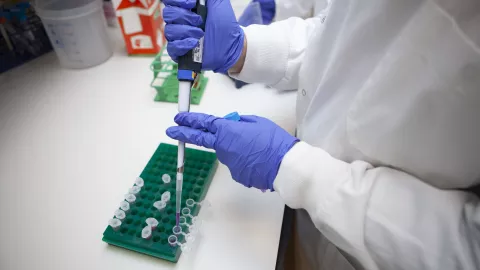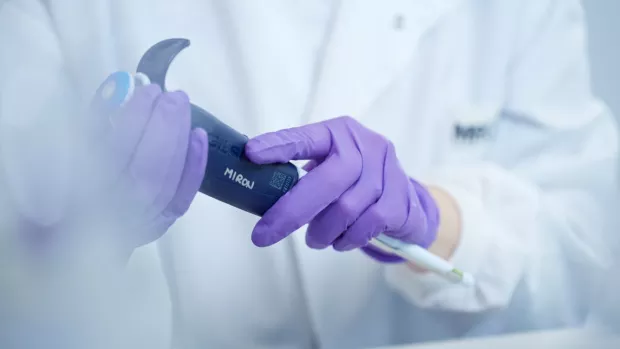
Mesenchymal stem cell therapy (MSCT)
Mesenchymal stem cells (MSCs) are found in many parts of the body and are usually taken from bone marrow, skin and fat tissue.
They can produce many different types of cells, including muscle and cartilage.
Early research suggests they might help to promote myelin repair and have a positive effect on the immune system.
MSCT for MS - what do we know?
Researchers are exploring the potential of mesenchymal stem cell therapy to protect nerves from damage and to encourage the repair of existing damage. A number of pilot studies have investigated the safety and effectiveness of MSCT. These studies have highlighted a number of minor side effects, and have revealed some promising early results.
MSCT involves isolating MSCs from the bone marrow. These cells are then multiplied in the lab and infused back into the blood or the fluid surrounding the spinal cord of the person undergoing therapy.
Promising results in a mouse model of MS
An early study looked at MSCs found in the fat tissue of mice as a tool for transplantation in MS. In transplanting these stem cells to mice with an experimental form of MS, markers of inflammation in the spinal cord and brain were reduced. This follows research that showed MSC therapy reduced inflammation by making the immune system less active.
Researchers have also shown that giving MSCs to a mouse model of MS can protect nerves from damage and help to reduce the severity of the condition. In this study, the rate of nerve loss was reduced in mice that received MSCs.
Clinical trial results
A number of early clinical studies have investigated the safety of isolating, growing, and re-injecting someone’s own MSCs. These studies have provided evidence of the safety and tolerability of MSC therapy, with only a number of minor side effects reported.
An early pilot study involved ten people with progressive MS. Researchers tested the safety of effectiveness of MSC injection into the fluid surrounding the spinal cord (intrathecal injection). One year after the therapy, one person had experienced an improvement in disability as measured by Expanded Disability Status Scale (EDSS) score. Four people saw no change in their level of disability, and five people experienced a worsening of disability. Researchers reported that whilst this study highlighted the feasibility of this treatment, larger studies were needed to more fully test the effectiveness of MSC therapy.
In 2012 the results of a small, phase 2 study were published. This study involved 10 people with secondary progressive MS, and researchers found that treatment with MSCs led to an improvement in visual clarity (acuity) and the speed at which messages were sent from eye to brain. These results suggest that MSCT may be neuroprotective. The treatment was well tolerated, with no serious adverse events reported.
In 2019 the results of an international, multi-centre trial called MESEMS were presented at a major European MS conference. The trial gave MSCT to 144 people with active MS (which means you are experiencing relapses and/or new lesions on an MRI).
Early results showed that MSCT is safe for people with both relapsing and progressive forms of MS. But the results did not show a reduction in inflammation (measured by the number of new lesions on an MRI scan) when compared with a placebo. We funded part of this work at Imperial College London.
Lab studies
We’ve also funded a study looking at how MSCs impact and interact with immune cells, and comparing this in cells from people with secondary progressive MS to cells from people without MS. The scientists got MSCs from a person’s bone marrow and got immune cells from the blood of that same person. They did this with 10 people without MS, and 10 people with secondary progressive MS. The scientists looked at the MSCs in a dish in the lab, and then looked at what happened when the immune cells were added.
They found that MSCs from people with MS aren’t as good at suppressing inflammation as MSCs from people without MS. It’s not yet clear what this means for MSC treatment for people with MS.



